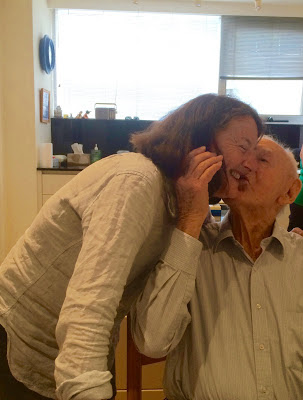Monday was D Day, the day my father would be moving into a nursing home. In the morning I left home early and drove into the city to pick him up. Sue, the lovely woman who had cared for him overnight, had him dressed and ready for me, his bags packed and his flat orderly and neat.
He came along happily, with no idea where we were going, though I’d spoken about it with him several times. I told him his doctors had ordered him to rest. ‘How do they know I need it?’ he asked. ‘I haven’t seen them.’ He was right but I ignored that.
He’d barely slept the night before so he napped in the car. At the front door of the nursing home, a couple bringing along an elderly relative recognised him and he became animated as he remembered who they were.
A nurse took us to his floor. On the way to his room we passed the activities room where a woman was playing the piano and singing and he stopped to sing along, his face lighting up. I asked him if he preferred to join in while I went to his room and he said he would. When I got back, the sing-along had finished and he was seated at a table in the dining room with a bib around his neck, eating lunch.
It made me sad that he’d accepted this so easily. Shouldn’t he have thought it wrong, a case of mistaken identity perhaps, that he’d been shepherded to sit amongst a group of strangers with no introduction or explanation? Shouldn’t he at least have been surprised? (Though, to be honest, my dad loves meeting strangers and forging connections with them. It’s one of his favourite pastimes.)
It’s now Friday and I am surprised by how smoothly this transition has gone.
The worst experience we had was after dinner on his first day. I thought I’d get him into bed to make him feel more at home. He was tired, he said.
It began well and he allowed me to take off his shirt and put on his pyjama top. I even managed to get him sitting down and his incontinence pad and pyjama pants in position, ready to pull up.
At that moment his brain froze and he didn’t recognise the pad.
At that moment his brain froze and he didn’t recognise the pad.
We went back and forward for about 40 minutes while he studied the thing from all angles and kept saying it was wrong, while I told him that if he stood up I could pull his pants up and he’d see it was right.
Normally I have endless patience for my dad but this was at the end of a long, anxious day for me. I’d got up early to drive him. I’d spent the day adjusting to the strange sights, sounds and smells of a dementia floor, and hovering over him while I watched for any sign of discomfort. Now I was drained.
I went looking for a member of staff to help me and then I left. At that point he was naked from the waist down, unbuttoning his pyjama top, but two nurses were there to take over from me.
I drove home sobbing, more from exhaustion than anything else, and slept only fitfully.
The next morning my dad greeted me as he always does, with love and tenderness. He had had breakfast, been showered, shaved and dressed, his leg wounds bandaged, his support stockings pulled up, and he was ready to face the day with the same beautiful, kind, optimistic spirit that has stood him in good stead for the last 97 ½ years.
During the day he participated eagerly in the exercise class, he sang along at the concert. At lunch he slid his foil-wrapped pat of butter across to his neighbour. ‘You have that,’ he told him. It was all he had but he was eager to share it. As we walked around several of the nurses stopped me to tell me they recognised Dad from when they worked at the nursing home where my mother spent her last year. ‘What a wonderful man,’ they said. ‘What a devoted husband.’
Right now as I write this I miss my dad so much. I want to ring him and tell him all about these things. At the same time I feel like I can breathe properly for the first time in many months.













